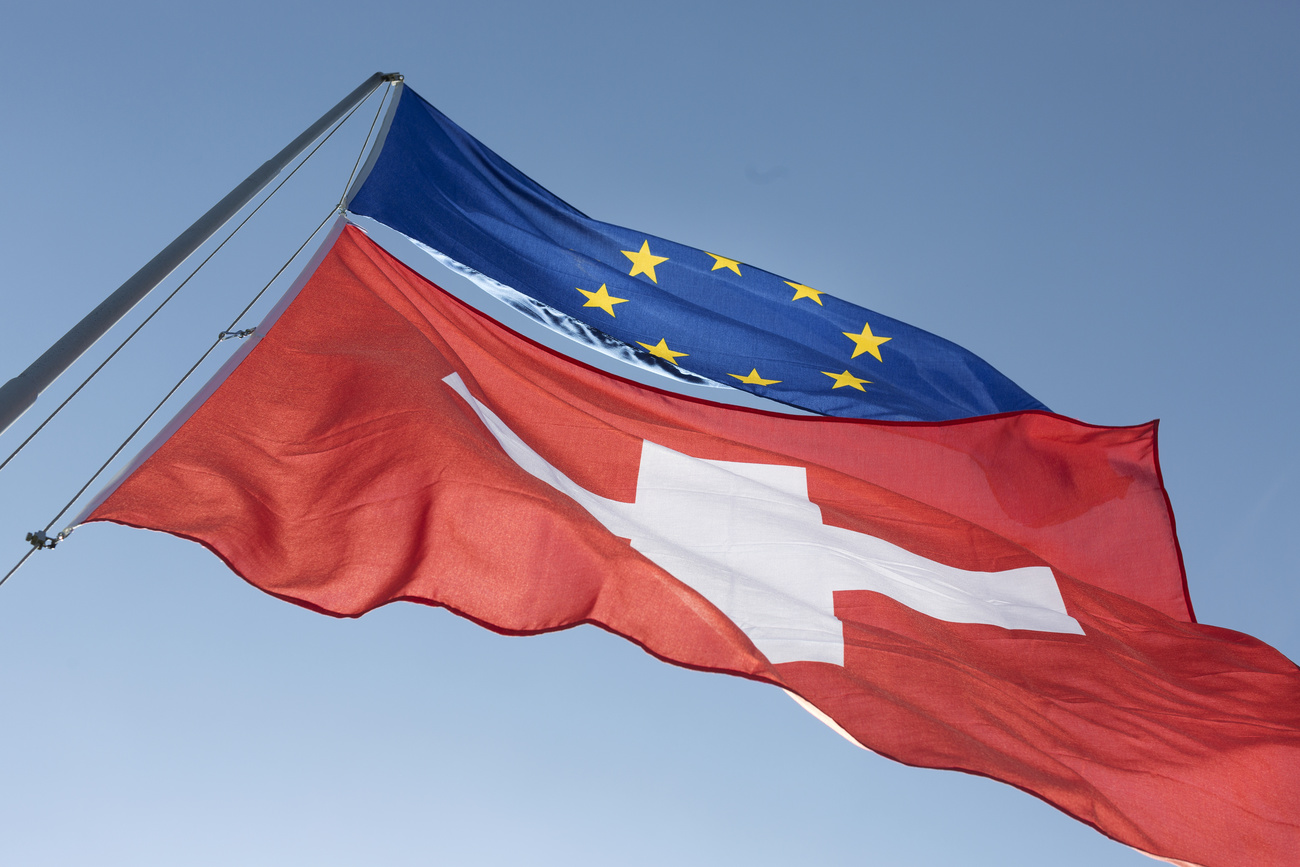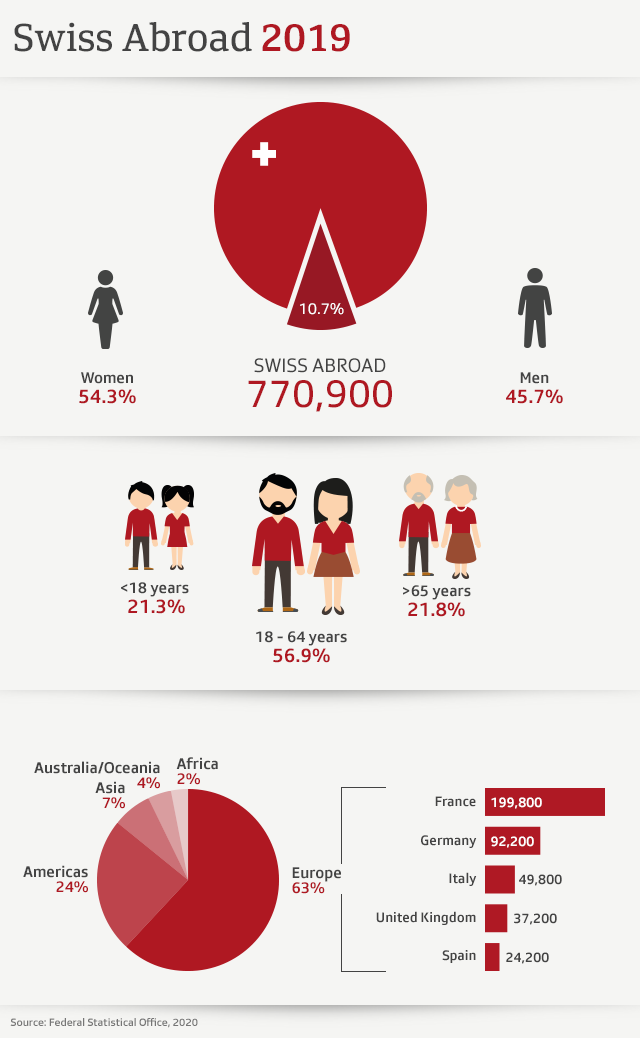
Immigration initiative could spell trouble for Swiss expats

The Swiss People’s Party’s latest attempt to scrap the free movement of people accord with the European Union (EU) aims to reduce the number of immigrants entering Switzerland. But approval of the right-wing initiative could have a negative impact on many Swiss living in European countries.
Around 460,000 registered Swiss currently live in EU countries, and they suffer directly the consequences of the end of the bilateral treaties with Brussels if this initiative is accepted on September 27. The Organisation of the Swiss Abroad (OSA) was unequivocal when it described such a scenario as a “catastrophe” in a recent statement.
However, the needs of the expatriate Swiss have played a rather minor role in the public debate ahead of this vote.

More
Why Swiss voters will decide again on EU immigration
The initiative committee’s arguments put forth in the official voters’ booklet only mention immigration into Switzerland, not Swiss emigration to other countries.
The government and parliament, who both have come out against the initiative, point out the impact such a move would have on Swiss citizens’ access to the European single market. After all, it is not only export-oriented companies that benefit from Europe, it is also the Swiss who want to live and work in the EU.

Take the example of Michael Obrist: He has been living in Vienna for the past six months, working for a startup company that offers digitalisation services.

In a phone interview, Obrist says that he has personally benefited from the close link between Switzerland and the EU during the past ten years abroad. (The call was made via WhatsApp as Switzerland is not part of the EU roaming regulations, thus a long-distance call would have been costly).
One of the benefits of Switzerland’s close links to the EU is of an academic nature.
“Thanks to the Erasmus education exchange programme, I was able to study in Vienna for one semester. At the time, switching studies to another country was easy,” Obrist explains.
When he decided to complete his MA in the Austrian capital, his previous qualifications from University of Bern in Switzerland were easily recognised.
Switching universities from Switzerland to a EU country has become more complicated with fewer choices since the Swiss accepted the anti-mass immigration initiative in 2014. This move put an end to the Erasmus student exchange programme, which is one of the EU’s best-known support programmes that helps students study, train and gain experience across the whole continent. Switzerland was downgraded from member to partner which caused great disdain, particularly among academic circles.
Efforts are underway to reintegrate Switzerland into the programme. The Swiss Student Union and the Swiss National Youth Council are fighting to get Switzerland back on-board next year. It would be a major setback for Erasmus if the Swiss voted in favour of the initiative.
Obrist also benefited professionally. After graduating, he went to Berlin where he first worked for a startup company in the education sector before he became self-employed. The move to Germany went smoothly. “The fact that I can easily move around the EU and have a lot of entrepreneurial freedom has enabled me to lead such a life,” he says.
More
According to Obrist, cross-border cooperation is particularly strong among startups. The synergies in this sector are very powerful in Germany, Austria and Switzerland. “It is very common for startups in these three countries to gain experience and hire people from abroad.”
“Switzerland in the 21st century would be unthinkable without the EU and the freedom of movement of people,” the New European Movement Switzerland wrote in its publication “At Home in Europe”. The organisation advocates for Swiss membership of the EU. It points out the percentage of the European workforce in sectors of the Swiss economy. In retail, for example, 20 percent of the employees are EU citizens while 25 percent of the nursing staff are from EU countries. One in three doctors are also from the EU. In agriculture, one in five workers come from a EU or EFTA country and find employment in Switzerland thanks to the freedom of movement of people.
Last but not least, the close link between Switzerland and the EU have been beneficial for Obrist’s private life.
He often goes back to Switzerland where he keeps in close contact with friends and family.
“The ability to easily move across borders is important for me,” he says.
“When frontiers were temporarily closed during the Covid-19 pandemic, many people probably became aware how privileged we usually are.”
How much is at stake if the Swiss voted in favour of the initiative to abolish the free movement of people is still unclear. Some legal uncertainties are to be expected and thousands of expatriate Swiss could lose their residence permits.
Obrist is convinced that it wouldn’t make sense to jeopardise the good relationship with the EU. “It would be a sign of an inflated self-esteem if Switzerland distanced itself from the EU, no matter in whatever form,” he says. “And it could backfire.”
Obrist believes that such a move would make his life more difficult professionally and personally. Of course, he could always return to Switzerland. “This, however, would be forced repatriation,” he concludes.
Translated from German by Billi Bierling

In compliance with the JTI standards
More: SWI swissinfo.ch certified by the Journalism Trust Initiative
















![The four-metre-long painting "Sonntag der Bergbauern" [Sunday of the Mountain Farmers, 1923-24/26] had to be removed by a crane from the German Chancellery in Berlin for the exhibition in Bern.](https://www.swissinfo.ch/content/wp-content/uploads/sites/13/2025/12/01_Pressebild_KirchnerxKirchner.jpg?ver=bb19e376)















Join the conversation!